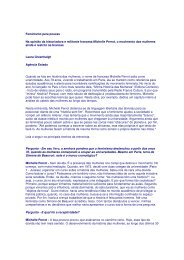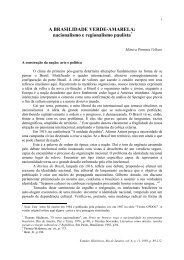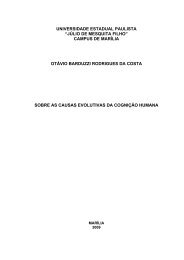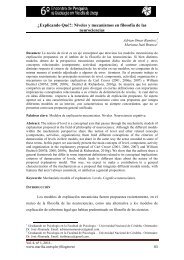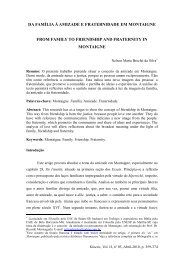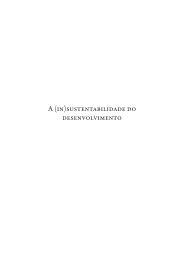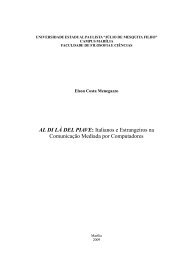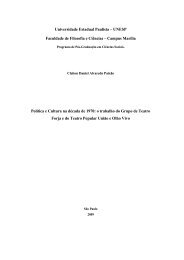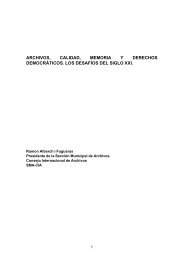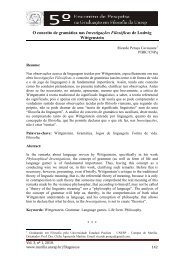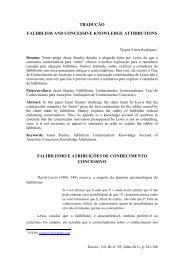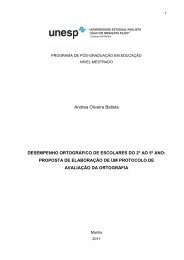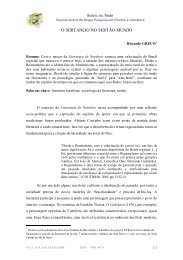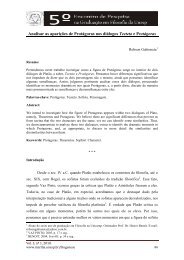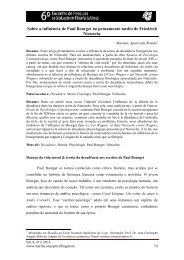Jean Piaget no século XXI - Faculdade de Filosofia e Ciências ...
Jean Piaget no século XXI - Faculdade de Filosofia e Ciências ...
Jean Piaget no século XXI - Faculdade de Filosofia e Ciências ...
Create successful ePaper yourself
Turn your PDF publications into a flip-book with our unique Google optimized e-Paper software.
M O N T O Y A , A . O . D . et al. (ORG.)<br />
Para nós que estamos a <strong>de</strong>monstrar o peso, o signifi cado, das hipóteses<br />
piagetianas, os vários tipos <strong>de</strong> RNA, justifi cam a importância que lhe <strong>de</strong>u <strong>Piaget</strong>;<br />
importância essa que ele hipotetizou e <strong>de</strong>duziu. Citemos <strong>no</strong>vamente a passagem<br />
acima, escrita por <strong>Piaget</strong> (1967a p. 920, grifo <strong>no</strong>sso)<br />
A genética molecular <strong>no</strong>s ensina que um gene é uma seqüência <strong>de</strong> 500 a 6000<br />
nucleotí<strong>de</strong>os (on<strong>de</strong> cada um po<strong>de</strong> ser alterado por mutação) or<strong>de</strong>nados segundo<br />
um código e on<strong>de</strong> uma bactéria é uma continuida<strong>de</strong> (suite) <strong>de</strong> n genes. Dentre esses<br />
é necessário distinguir “operadores” que dão origem a uma estrutura <strong>de</strong> proteína e<br />
agem assim sobre a morfogênese segundo uma direção irreversível centrífuga (do<br />
ADN ao organismo em crescimento por intermédio do RNA).<br />
Mas existe também os genes “reguladores” que modifi cam o funcionamento<br />
dos outros e que comportam processos retroativos (feedback) pondo em marcha<br />
os termos iniciais. As bruscas “mutações” não ocorreriam diretamente em função<br />
do meio, ao contrário, como já dissemos, haveria “escolha” <strong>no</strong> núcleo da célula.<br />
<strong>Piaget</strong>, um neo-lamarckista, faz ressalvas às idéias <strong>de</strong> Lamarck que sugerem mutações<br />
diretas do genótipo em função <strong>de</strong> alterações fe<strong>no</strong>típicas e não por intermédio <strong>de</strong> um<br />
equivalente ao RNA que ele houvesse imaginado e que permitiria, então, a “escolha”.<br />
Em suma, <strong>Piaget</strong> foi um genial biólogo preocupado com as trocas do<br />
organismo com o meio (consi<strong>de</strong>radas, antes <strong>de</strong> mais nada, como um fenôme<strong>no</strong> que<br />
ocorre <strong>no</strong> organismo) e hoje, agora, na primeira década do <strong>século</strong> <strong>XXI</strong>, seus mo<strong>de</strong>los<br />
hipotético-<strong>de</strong>dutivos estão sendo comprovados, mas sem citá-lo, pois o manto da<br />
psicopedagogia impediu esse reconhecimento.<br />
O Journal of Neuroscience, em 2009, publica o artigo: Transgenerational Rescue<br />
of a Genetic Defect in Long – Term Potentiation and Memory Formation by Juvenile Enrichment,<br />
Arai, J. A., Feig, L. A. et allii, o qual <strong>de</strong>monstra que:<br />
The i<strong>de</strong>a that qualities acquired from experience can be transmited to future offspring<br />
has long been consi<strong>de</strong>red incompatible with current un<strong>de</strong>rstanding of genetics.<br />
However, the recent documentation of <strong>no</strong>n-Men<strong>de</strong>lian transgenerational inheritance<br />
makes such a “Lamarkian”- like phe<strong>no</strong>me<strong>no</strong>n more plausible. Here, we <strong>de</strong>monstrate<br />
that exposure of 15-d-old mice to 2 weeks of an enriche<strong>de</strong>d environmt (EE),<br />
that inclu<strong>de</strong>s exposure to <strong>no</strong>vel objects, elevated social interactions and voluntary<br />
exercise, enhances long term potentiation (LTP), <strong>no</strong>t only in these enriched mice<br />
but also in their future offspring Through early adolescence, even if the offspring<br />
never experience EE. In both generations, LTP induction is augmented by a newly<br />
appearing cAMP/p38 MAP kinase-<strong>de</strong>pen<strong>de</strong>nt signaling casca<strong>de</strong>. Strikingly, <strong>de</strong>fective<br />
LTP and contextual fear conditioning memory <strong>no</strong>rmally associated with ras-grf<br />
k<strong>no</strong>ck-out mice are both masked in the offspring enriched mutant parents. The<br />
transgenerational transmission of this effect occurs from the enriched mother to<br />
her offspring during embryogenesis. If a similar phe<strong>no</strong>me<strong>no</strong>n occurs in humans, the<br />
effectiviness of one’s memory during adolescence, particularly in those with <strong>de</strong>fective<br />
10



